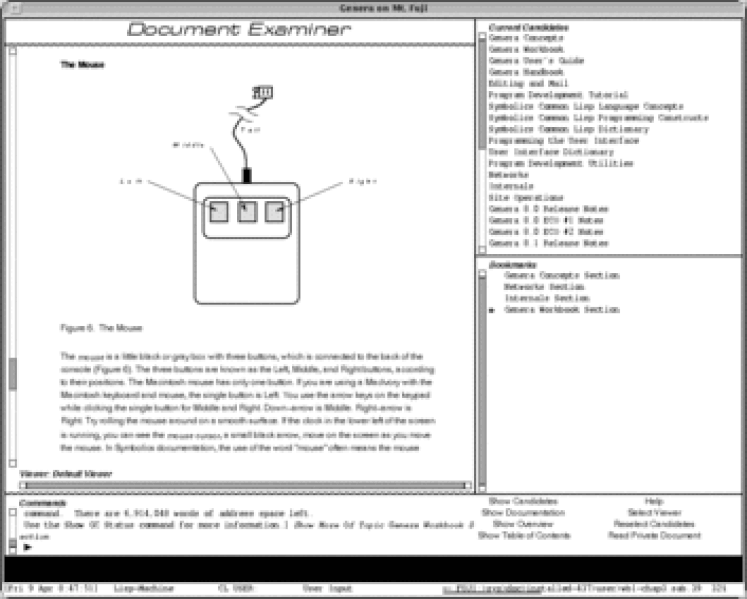(via Bill de hÓra)
If I were the author of a significant IDE product I would take a fair bit of time to understand the history of my marketplace. Apparently Dmitry Jemerov does not follow that philosophy. I guess that has not hurt his success any. So I have to wonder how much the history of our field matters to its future.
Consider the following image of a Symbolics hypertext system from the mid-late 1980s. Who noticed at the time? Who would've believed such a thing was possible then or even now using a "dynamic language"? 150 years from now what does anyone need to remember? A couple of blips maybe: Netscape and Excel?
Dmitry writes...
Groovy is interesting, but it's a dynamic language and has all the problems of dynamic languages. It's OK for small pieces of code. But building something the size of IntelliJ IDEA [in a dynamic language] would be a complete nightmare.So let's consider history's demonstration that this is false.
- GNU Emacs - Lisp
- Zmacs - a predecessor to GNU Emacs, Lisp, running on the Lisp machine
- Various Lisp machine operating systems including Symbolic's Genera, one from Texas Instruments based on one from MIT, one (at least) from Xerox
- Symbolic's Concordia authoring tool and Document Examiner hypertext system - em, Lisp again
- Smalltalk tools, which I've written about several times already
Since Smalltalk I've generally been using Eclipse for work stuff, but the effort in extending the environment has just been too much work for me to invest in, though I've tried a few times. I settle for writing ant scripts; that's how bad things have gotten - I'm programming in XML.And Joe Gregorio writes...What's on the horizon? Eclipse has E4. Which seems like it's largely a cleanup/sanitization of Eclipse, vs a complete re-think. I suspect I will write as many extensions for E4 as I have for the previous versions of Eclipse. Perhaps I'll sit that out and wait for Steve Northover's E5. Frankly, I think it's time we started fresh; let's call it F1.
Poor old disrespected Smalltalk, all those years of work, all that cutting edge research, and nary a bit of credit, which is particularly galling if you think about the fact that, to date, the language that has benefited the most from Smalltalk is Java.


3 comments:
That quote is missing a bit of context:
"In my day job, I have to make changes in many places of the code. Static types are the only thing that lets me jump into any place in the code base and understand what everything is around me. I need to know what things are, what I can do with various things around the code that I need to change. With static types, I see that immediately. With a dynamically-typed language, I would need to spend half an hour investigating what goes where and what is what before being able to make a single change."
That's what you should be arguing against. Static typing in Java allows him to make incredibly complex queries of a massive codebase with ease, something IDEA excels at. With 'dynamic' languages, you basically have just a blob of text, at least comparatively.
And the existence of emacs doesn't mean it wasn't a nightmare to produce. It's certainly a nightmare to look at. :/
As an old Smalltalk'er I fully agree that history matters. Knowing that there is a much better way than file-based IDEs makes a world of difference to the way I develop. Using something like eclipse or JetBrains is like "slugging through quicksand" instead of "sprinting" through a Smalltalk environment. If Ruby is the new Smalltalk, I can't wait until Ruby gets development tools that Smalltalk had 25 years ago!!! Then we'll see some real productivity.
Jon
http://shellshadow.com
"With 'dynamic' languages, you basically have just a blob of text, at least comparatively."
Unless you have good tools, which essentially is what having IntelliJ amounts too. Tools just as good if not better have existed in the "dynamic language" world for much longer than the "static language" world.
"And the existence of emacs doesn't mean it wasn't a nightmare to produce. It's certainly a nightmare to look at. :/"
I've certainly seen my share of nightmares in all kinds of languages. Emacs is elegant though. The structure is simple and all the details hang off of that.
Post a Comment